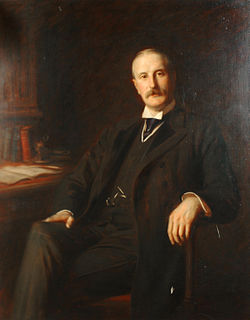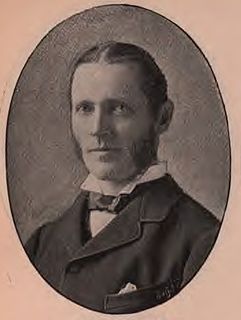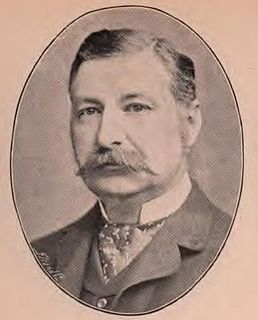Frank Hardcastle (12 May 1844 – 6 November 1908) was a bleacher and businessman and Conservative politician who sat in the House of Commons from 1885 to 1892.

The Conservative Party, officially the Conservative and Unionist Party, is a centre-right political party in the United Kingdom. The governing party since 2010, it is the largest in the House of Commons, with 313 Members of Parliament, and also has 249 members of the House of Lords, 18 members of the European Parliament, 31 Members of the Scottish Parliament, 12 members of the Welsh Assembly, eight members of the London Assembly and 9,008 local councillors.

The House of Commons is the lower house of the Parliament of the United Kingdom. Like the upper house, the House of Lords, it meets in the Palace of Westminster. Officially, the full name of the house is the Honourable the Commons of the United Kingdom of Great Britain and Northern Ireland in Parliament assembled. Owing to shortage of space, its office accommodation extends into Portcullis House.
Hardcastle born at Firwood Hall (demolished 1969), in Tonge, near Bolton, Lancashire was the fourth son of James Hardcastle of Firwood and Pen-y-lan, Ruabon, Denbighshire and Hannah Compton Jackson. [1] Following education at Preston Grammar School and Repton School where he excelled at cricket, Hardcastle joined the family business of T. Hardcastle and Sons, bleachers and dyers, of Firwood Works. [2] The company had been formed by his grandfather Thomas Hardcastle in 1803. Hardcastle played cricket regularly from 1864 representing Manchester, Bolton and the Gentlemen of Lancashire. In 1869 he played two first-class matches for Lancashire County Cricket Club. [3]
Tonge with Haulgh was a township of the civil and ecclesiastical parish of Bolton le Moors in the Salford hundred of Lancashire, England. In 2011 it was a ward of Bolton Metropolitan Borough Council. The ward population at the 2011 census was 13,126.
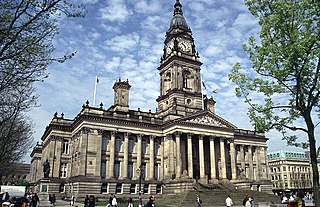
Bolton is a town in Greater Manchester in North West England. A former mill town, Bolton has been a production centre for textiles since Flemish weavers settled in the area in the 14th century, introducing a wool and cotton-weaving tradition. The urbanisation and development of the town largely coincided with the introduction of textile manufacture during the Industrial Revolution. Bolton was a 19th-century boomtown, and at its zenith in 1929 its 216 cotton mills and 26 bleaching and dyeing works made it one of the largest and most productive centres of cotton spinning in the world. The British cotton industry declined sharply after the First World War, and by the 1980s cotton manufacture had virtually ceased in Bolton.

Lancashire is a ceremonial county in North West England. The administrative centre is Preston. The county has a population of 1,449,300 and an area of 1,189 square miles (3,080 km2). People from Lancashire are known as Lancastrians.
Hardcastle rose to be head of the family bleaching firm and also became president of the United Bleachers' Association of Lancashire and Cheshire. [3] His cousin Thomas Hardcastle Sykes was head of one of the other major bleachers. Hardcastle was also the proprietor of Breightmet Colliery near Bolton. [4]
Thomas Hardcastle Sykes was an English bleacher and businessman and was High Sheriff of Cheshire.
Hardcastle was the first member of parliament for Westhoughton, a constituency created by the Redistribution of Seats Act 1885. He was re-elected unopposed in the ensuing general election of 1886. [5] While in parliament, Hardcastle represented the interests of the bleaching industry. He retired from parliament on health grounds in 1892. [2] He was a justice of the peace for Lancashire, and was High Sheriff of Lancashire in 1895.
A member of parliament (MP) is the representative of the voters to a parliament. In many countries with bicameral parliaments, this category includes specifically members of the lower house, as upper houses often have a different title. Member of Congress is an equivalent term in other jurisdictions.
Westhoughton was a parliamentary constituency in Lancashire, England. Centred on the former mining and cotton town of Westhoughton, it returned one Member of Parliament (MP) to the House of Commons of the Parliament of the United Kingdom.

The Redistribution of Seats Act 1885 was an Act of the Parliament of the United Kingdom. It was a piece of electoral reform legislation that redistributed the seats in the House of Commons, introducing the concept of equally populated constituencies, a concept in the broader global context termed equal apportionment, in an attempt to equalise representation across the UK. It was associated with, but not part of, the Representation of the People Act 1884.
Hardcastle moved from Lancashire to Southsea in Hampshire, and finally to London. He died suddenly from heart failure at his residence, 87 Lancaster Gate, Paddington in 1908, aged 64. [2]

Southsea is a seaside resort and geographic area, located in Portsmouth at the southern end of Portsea Island, Hampshire, England. Southsea is located to the south of Portsmouth city centre and to the east of Old Portsmouth. It developed as a fashionable Victorian seaside resort in the 19th century, originally named Croxton Town, but later borrowed the name of nearby Southsea Castle to promote itself and grew into a dense residential suburb and large distinct commercial and entertainment area, separate from the centre of Portsmouth. The 'Southsea' name of the area originates from Southsea Castle; a fort, located on the seafront and constructed in 1544 to help defend the Solent and approaches to Portsmouth Harbour.
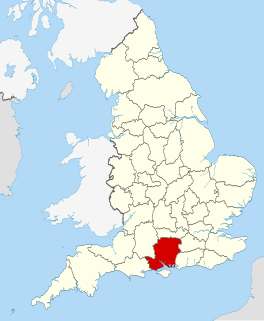
Hampshire is a county on the southern coast of England. The county town is the city of Winchester. Its two largest cities, Southampton and Portsmouth, are administered separately as unitary authorities; the rest of the county is governed by Hampshire County Council.

Paddington is an area within the City of Westminster, in central London. First a medieval parish then a metropolitan borough, it was integrated with Westminster and Greater London in 1965. Three important landmarks of the district are Paddington station, designed by the celebrated engineer Isambard Kingdom Brunel and opened in 1847; St Mary's Hospital; and Paddington Green Police Station.
Hardcastle married Ida Ross in 1885, and they had five daughters before her death in 1894. [1] In 1902 he married again. [2] His second wife was Mary Elizabeth Armytage Moore (c1845-1932), previously Mary Elizabeth Lockwood, née Mary Elizabeth Metcalfe (she had been twice widowed, her previous marriages being to (1) Horace Day Lockwood, son of Henry Francis Lockwood, and then to (2) William Armitage Moore), whom he married at St Margaret's, Westminster on 10 June 1902. [6] One of her daughters, Priscilla Armytage-Moore, became Priscilla, Countess of Annesley (see Hugh Annesley, 5th Earl Annesley).
Henry Francis Lockwood was an influential English architect active in the North of England.
Hugh Annesley, 5th Earl Annesley was a British military officer and Member of Parliament for County Cavan from 1857 to 1874.
